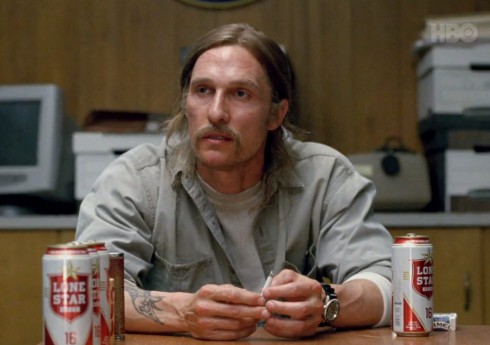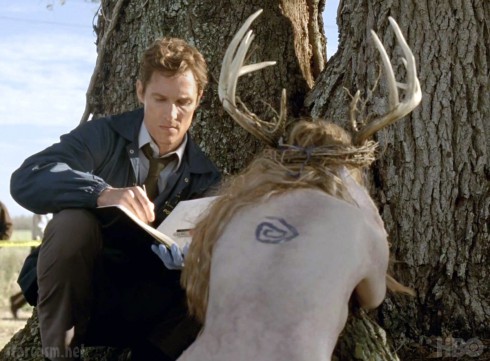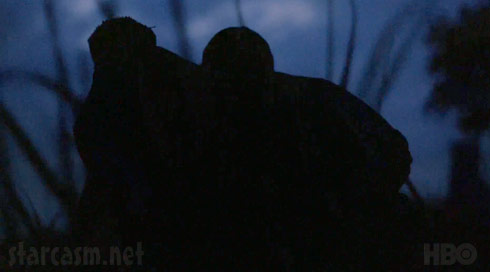True Detective spoilers – a theory on what’s really going on
HBO’s True Detective is only five episodes old, but it is already garnering a level of scrutiny and examination equal to that of Lost in its final two seasons. Fans and critics alike are playing detective by attempting to decipher a seemingly endless array of clues and references and get to the bottom of the mystery of the identity of the Yellow King. Until yesterday I had consciously avoided this dialogue because I knew that it would probably transform me into an obsessive Rust-like insomniac, potentially putting my job and my family at risk.
Ah, but as I’m sure Rust would have stated a lot more eloquently, we are powerless to avoid the inevitable, and early yesterday I found myself reading a post (and the comments) about True Detective clues over at HitFix.com.
It’s been more than 24 hours now and aside from what couldn’t have been more than six hours of sleep, I’ve been rewatching True Detective episodes nonstop, with notepad in hand, as though I were the Tax Man himself. “You never know what the thing’s gonna be, do ya? The little detail somewhere down the line that makes you say, ‘ah!’”
UPDATE – Click here for lots of behind-the-scenes photos from the set of True Detective, which seem to reveal a lot about what we can expect from the last few episodes!
I decided last night I would try to compile my thoughts into a post prior to tonight’s sixth episode, but little did I realize that my obsession would gobble up so much time that I may risk not having it done in time. All of that being said, I feel that I am adequately prepared to offer up my theory of the True Detective Truth.
It is my theory that Rust Cohle’s daughter wasn’t killed in a car accident but went missing — presumable kidnapped and killed by the “Yellow King.” Rust told Marty in the car that it was a car accident, but when he was describing the death of his daughter to detectives Gilbough and Papania he says she was riding a tricycle on the driveway and he starts to describe the location before trailing off. Perhaps riding her tricycle on the driveway was just the last time he saw her?
Rust’s obsession with the Yellow King deaths makes complete sense if he is trying to solve his own daughter’s murder case the entire time. He says in his 2012 interview that after his daughter’s death he transferred to narco and “started hittin’ it, you know, 24/7,” which I would say was because he was actually working his daughter’s case. “Somewhere in there Claire left,” Rust reveals before adding, “And somewhere in there I emptied a 9 into a crankhead for injecting his infant daughter with crystal. He said he was trying to purify her.”
Someone injecting a child with meth in a purification process? Hmmmm… More on that in another post.
Rust seems to be talking to himself (perhaps his true gift in the “hot box”) when interrogating the scarred guy who had been arrested for breaking and entering (and masturbating):
“You’re not bad. It’s not you. There’s a weight, and it’s got some fishhooks in your heart and your soul. No what you did, it’s not your fault. It’s not. You were drug to the bottom by that same weight. The same weight that won’t let you get along with a job, the same weight that won’t let you get along at school, the same weight that wouldn’t let you have a mom. I know these things, Chris.”
The weight for Rust is the grief and guilt surrounding his daughter’s unsolved murder. (Rust goes on to tell the prisoner that he just needs to ask for forgiveness, but he seems to be consciously playing the part of the preacher he summarily dismissed at the tent revival, going so far as to lay his hand on the man’s head when he was done. Unfortunately for Rust, he doesn’t believe what he’s saying at this point — he just knows that he needs to appear to have conviction when he says it to sell the illusion.)
Marty appears to back up my theory with some of his descriptions of Rust as well as some of his statements about being a dad, which I first thought was about himself. “A father’s burden — It’s too much for some men,” Marty says in the very first episode. He later adds, “Past a certain age, a man without a family can be a bad thing.”
Rust sacrificing himself and his life to finding his daughter’s killer(s) seems to be reinforced by what he says about the crucifixion that hangs above his bed in his sparse apartment. When Marty asks him about it, Rust explains that it is for contemplation. “I contemplate the moment in the garden, the idea of allowing your own crucifixion,” he says.
It would also explain why the billboard (above) asking “Do you know who killed me?” seems to haunt Rust so much. The date the young woman on the billboard (Stacy Gerhart) went missing (1987) was within a couple of years of when Rust’s daughter died, so clearly it is a reminder that he doesn’t know who killed her. And the fact that the billboard has aged so much just reinforces how much time has gone by without an answer.
(On a curious sidenote, a commenter at HitFix points out that the billboard may be a reference to an actual billboard infamous in Southern Louisiana. The father of Kathy Page, who was murdered in 1991, continues to erect billboards calling for justice in his daughter’s slaying, accusing the local police of accepting bribes to cover up the murder. Her father believes Kathy’s husband, Steve Page, was the killer. Wait, police involved in the cover up? Hmmmm…)
In addition to the billboard, Rust also seems to freeze up whenever he sees a young girl. After seeing the girl in this next photo waving along the roadside, Rust asks Marty, “Do you believe in ghosts?”
It’s my theory that Rust’s investigation while a “wildcard” narco eventually led him to Louisiana, so he took the job as a state policeman in the Criminal Investigation Division’s homicide department.
I believe that Rust truly thought he had captured his daughter’s killer in Reggie Ledoux, and had even managed to move on with his life with a steady girlfriend and a promising career. But seven years after apprehending Ledoux, Rust was interrogating another suspect in the hot box when the suspect says Rust and Marty didn’t get the real killer. Rust doesn’t take it too seriously, but then the guy mentions the Yellow King. Rust freaks out.
It was right around this time (2002) that Rust broke things off with his girlfriend and he and Marty had their “falling out.” Rust eventually dropped off the face of the Earth for eight years before turning back up in 2010, not long before the murder in Lake Charles.
I think Rust allowed himself to be seen numerous times at the crime scene so he would be called in and interrogated. I think Rust did it so that he could see what police had on the case, and to get a read on the detectives working the case. And I love the way he asked for beer so that everything he said from that point on would be inadmissible and the first thing he wanted to know was information on the Lake case.
It’s like Marty said in his interview five days later — they thought they were getting a read on Rust Cohle, but it was actually Rust Cohle getting a read on them.
I’m going to wrap things up by being like the devil’s nets and Macie Hart’s crown and going out on a limb… I think Marty and Rust are working the case together. I realize how much circumstantial evidence there is out there to support Marty being in on the killings, but I can’t (or perhaps won’t allow myself) to buy into that theory.
At the very beginning of the first episode we see what appears to be two men struggling through the dark together (above) just before someone starts a fire with what looks like one of the twig tripods. I think it’s Rust and Marty finally breaking the case. Marty left the force, but he started a security firm and was doing work as a private investigator — which would seem to jibe with reopening the investigation without sending up a red flag to the powers that be that they were reopening the investigation. (More on that in what I hope to be an upcoming “Who is the Yellow King?” post.)
The biggest reason that I don’t think Marty is part of the Yellow King cover up is that he is so terrible at lying and deception, not to mention acting! We see him repeatedly showing his cards so to speak, and Rust even calls him out on in after Marty saw his mistress at the bar. There is a moment during his interview in 2012 that Marty says, “I haven’t talked to Rust in 10 year. Yep.” But he appears to obviously be lying — which backs up my theory in two ways!
So anyways, there you have it. I suppose we will know soon enough if my theory was correct. 🙂
New episodes of True Detective air Sundays on HBO at 9/8c, or you can check them out any time on HBOGo.com.
UPDATE – I just saw Episode 6 and it looks like I was wrong (make that way wrong) about Rust and Marty being in cahoots from 2002 to 2010.







